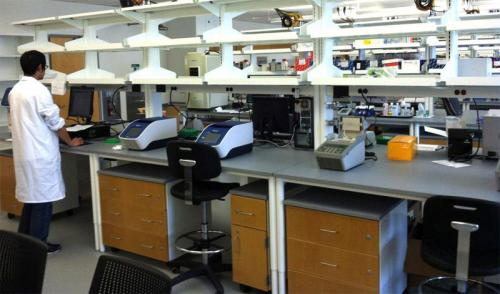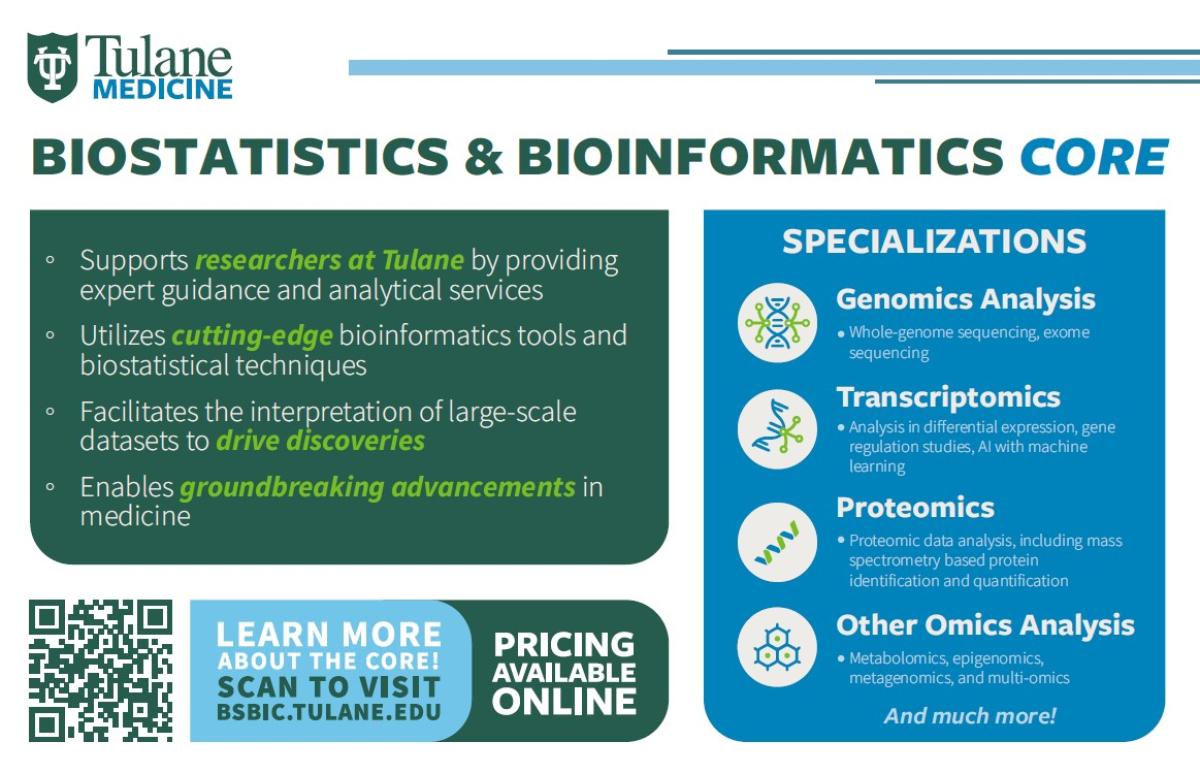
Mission
The mission of the Center for Biomedical Informatics and Genomics (CBG) is to promote research and education in biomedical informatics, computational biology, various omics, drug repurposing, and translational research of human complex diseases/traits with the goal of accelerating the pace of scientific discovery, reducing mortality and morbidity, and improving the quality of human life.
Research

The CBG faculty conducts multi-/inter-disciplinary research with the goal of accelerating the pace of scientific discovery, reducing mortality and morbidity, and improving the quality of life of Americans. One of the primary research interests includes all those areas that are related to addressing the question: What and how do genetic and environmental factors incur higher risk of, or better protection against, complex diseases, such as osteoporosis, in different sex and ethnic groups? Theoretical (e.g., methodology development in biostatistics/bioinformatics) and empirical (e.g., clinical data collection and wet/dry labs data collection/management/processing/analyses) approaches are used. We are most interested in generating, analyzing, and integrating big data of various omics in vivo in humans. The purpose is to elucidate how DNA variants affect gene expression/regulation and protein expression/modification in the form of functional networks/modules/pathways and how the knowledge gained on these molecular mechanisms in humans would translate into better prediction/intervention/precision medicine and drug development/repurposing. CBG faculty have won numerous NIH/NSF grants, including the P50 center grant and U19 program grant, and have advised/mentored more than 100 graduate students and faculty. Many of the mentees have become tenured professors winning their own grants with their own research centers/programs and some become academic and industrial administrators such as associate deans, department chairs, and vice presidents of genomics companies. Other important areas of research include big data, medical image analyses with integration to multi-omics data, and machine learning/deep learning, as applied to electronic health records and omics approaches.
Collaboration
The CBG encourages, promotes, and supports interactive and collaborative research in various fields, such as biomedical informatics (especially bioinformatics and image informatics, now expanding to health informatics), biostatistics, health informatics, computational biology, data sciences, human genetics, genomics, and proteomics, epigenomics, metabolomics, metagenomics, metabolomics, drug repurposing, machine learning and deep learning, and single-cell sequencing-based research.
- Analytical methodology development for association studies, whole-genome sequencing studies, genome-wide transcriptome studies, epigenetic/epigenomic studies, proteomics, metagenomics, metabolomics, biomedical informatics, and imaging informatics studies.
- Clinical, genetic epidemiologic, genomic, transcriptomic, epigenomic, proteomic, metagenomic, and metabolomic studies of human complex diseases/traits, such as osteoporosis, sarcopenia, obesity, osteoporotic fracture, female health-related diseases/traits (e.g., age at menarche, age at menopause), and recently, COVID-19.
- Machine learning and deep learning for biomedical big data research (including electronic health/medical records)
- Short-term goals: to develop and establish biomedical informatics, bioinformatics, various omics, system medicine, and computational research as a major area of research and education strength at Tulane University for research funding, publications, and education hub of next-generation researchers.
- Long-term goals: to build a first-class center leading cutting-edge research in biomedical informatics, multi-omics, computational, molecular biological and translational research of human diseases; to attain national and international recognition for excellence in biomedical informatics, various omics, system medicine, and computational research; and to be predominantly extramurally funded.
- Assisting/advising researchers in exploiting existing and emerging biomedical informatics and computational approaches and tools.
- Helping researchers focus on their expertise in research and be increasingly competitive in extramural grant applications through the assistance of biomedical informatics and genomics from the CBG.
- Educating and training young and new investigators in biomedical informatics, omics research, and system medicine, and the related fields.
- Offering services for various types of omics studies such as whole genome sequencing, proteomics, metabolomics, metagenomics, and genomic methylation pattern characterization.
- Providing aids in designing and managing biological databases, support for exploring the high-performance computing facilities housed in the CBG, and appropriate statistical, genetic, and genomic analyses of experimental data, based on the Center investigators' expertise.
- Advising/consulting on, participating in, and organizing large grant applications (such as P01, P50, and U-19 grants) from the aspects of the expertise of the CBG faculty.
The CBG is dedicated to providing a broad range of fee-based and/or collaborative services and educational opportunities to the research community within Tulane University and internationally. Details about fee-based services are available on the Tulane Biostatistics & Bioinformatics Core website. The mission of the Tulane Biostatistics and Bioinformatics Core (TBBC) is to support researchers at Tulane University by providing expert guidance and analytical services that transform complex biological data into meaningful insights. We employ cutting-edge bioinformatics tools and biostatistical methods to facilitate the interpretation of large-scale datasets, enabling groundbreaking discoveries and advancements in medical science. Our core specializes in the comprehensive analysis of high-throughput omics data, including genomics, transcriptomics, proteomics, and other emerging fields.
- Genomics: Our core offers extensive expertise in the analysis of genomic data, including whole-genome sequencing, exome sequencing, and genome-wide association studies (GWAS). We help researchers identify genetic variants, understand genetic architecture, and uncover the molecular basis of diseases.
- Transcriptomics: We provide comprehensive support for transcriptomic analyses, including RNA sequencing (RNA-seq), single-cell RNA sequencing (scRNA-seq), and Spatial Transcriptomics with different platforms. Our services encompass, e.g., differential expression analysis, gene regulation studies, and pathway enrichment analysis, network system biology analyses, AI analyses with machine learning, helping to elucidate gene expression patterns and regulatory mechanisms.
- Proteomics: Our core is equipped to handle proteomic data analysis, including mass spectrometry (MS) based protein identification and quantification. We assist researchers in identifying protein biomarkers, understanding protein interactions, and studying post-translational modifications, ultimately contributing to the understanding of cellular functions and disease mechanisms.
- Other Omics: In addition to genomics, transcriptomics, and proteomics, we offer expertise in metabolomics, epigenomics, metagenomics and multi-omics analyses at bulk and single-cell levels. Our integrated approach allows for the comprehensive analysis of multi-omics data, providing a holistic view of biological systems and facilitating the discovery of novel therapeutic targets.
At the Biostatistics and Bioinformatics Core, we are committed to fostering a collaborative research environment. Our team of experienced bioinformaticians and biostatisticians works closely with investigators to design robust experiments, perform sophisticated data analyses, and interpret results with precision. Through our services, we aim to accelerate scientific discovery and enhance the impact of research conducted at Tulane University.

